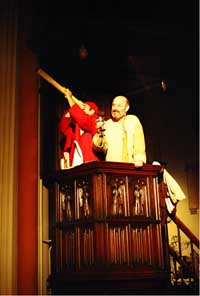Kate Hall describes the maxims that get her through the challenges of site-specific theatre

I became interested in touring to unusual venues while working for the RSC as an assistant director on one of their regional tours. We would visit areas which did not have easy access to RSC productions and import a fully-functional theatre into leisure centres and school halls. Having previously spent the necessary apprenticeship slogging on the London fringe, this tour of sweaty sports halls was a revelation. On the fringe I felt like I knew half the audience already and could predict their reaction to a work, but on tour we would roll into a different town every week and make new, enthusiastic friends. I also discovered that playing in strange places can add to the work – it is another creative edge to rub against.
I am now the Artistic Director of Jumped Up Theatre, which tours to site-specific venues. I cannot say it has always been easy, or never reduced me to tears or tantrums, but these are the maxims that get me through:
1. Look after the venue. Be a polite, cheerful and sociable guest. It is not unusual to be greeted with nervous trepidation, so reassure the custodians of your new, temporary and strange home that you are not going to burn it down. Washing up your mugs is a good start. Talk positively with every staff member you meet about your project and their venue. Smile and learn their names, ask them for advice and ply them with cake. Show them that you know what you are doing. When we started rehearsing A Workhouse Christmas at Peterborough Museum we were greeted with suspicion – were we just exploiting their beautiful building for our own purposes? On the last night of the run the staff asked when we were coming back.
2. Look after the audience. You want your audience to arrive in good time and good humour. So, for instance, do not skimp on signage to a venue and include directions on your website. Make sure you provide support for audiences with different needs; if your event involves a lot of standing and steps then someone with a walking frame will undoubtedly turn up, so have a plan to deal with this.
3. Look after the company. Theatre touring is tiring at the best of times, but when it is somewhere ‘chilly and uncomfortable’ (thanks Time Out) it really helps if there is a place where you can put your feet up and have a cup of tea – ideally in private. HOUSE was a play we put on in my home, and never have the garden chairs or my ability to weed been so appreciated.
4. Learn to explain the event in a succinct sentence. You will be asked by everyone, from venue staff to journalists, from actors to punters, about what you are doing. You need to be extremely efficient in your reply because sometimes the window of opportunity will be very short. Such as the time I had to stop a dustcart in the street because it was about to spoil the ambience of a Victorian pauper’s death in the snow.
5. When something goes wrong, do not freak out. Just when you think you have covered every eventuality something will happen which you could not have predicted. We turned up at one church venue, for our production Galileo, to find that the builders had turned the water off, so no heating or toilets, and there was a flood streaming across the floor from a burst pipe. I smiled at the vicar and reassured him that it would be fine. He allowed everyone, including the audience, to use the toilets in the vicarage and make hot drinks in his kitchen. And I mopped between cues.
Do all this and – if you are producing work that is astounding and unique – audiences will look at theatre in a new way. Venues will look at themselves in a new way, and thank you for it. And your company will stand out from the crowd.
Kate Hall is Artistic Director of Jumped Up Theatre
W www.jumpeduptheatre.com



